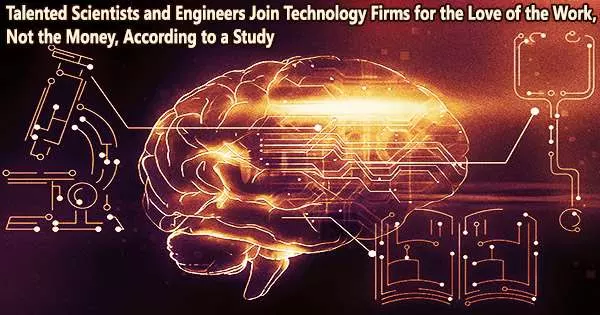The University of Illinois at Urbana-Champaign and ESMT Berlin have conducted new study that reveals the factors influencing the employment decisions of brilliant STEM Ph.D.s and demonstrates how and why companies can hire highly qualified scientists and engineers.
Startups in the technology industry are frequently urged to work with the top scientists and engineers to successfully commercialize cutting-edge products. But why would talented workers turn down jobs in big companies like Amazon and Google to instead work in riskier startups for lower pay?
Indeed, a growing corpus of data on entrepreneurship demonstrates that startup employees earn far less than their peers in large, established organizations, which has been interpreted as proof that startups are unable to acquire high-ability people.
However, in a forthcoming study in Management Science, Michael Roach, associate professor at the Gies College of Business, University of Illinois at Urbana-Champaign, and Henry Sauermann, professor of strategy and academic director of the Vali Entrepreneurship Hub at ESMT Berlin, show that some high-ability workers prefer to join startups for non-monetary benefits despite earning lower pay.
“A key insight from our research is that many high-ability scientists and engineers choose jobs in early-stage startups over large tech companies due to specific career preferences that align better with the unique work setting offered in startups,” says Michael Roach. “Many of these individuals are interested in being startup employees rather than founders, which differs from the popular notion that it is primarily aspiring entrepreneurs who choose to work in startups.”
In addition, Roach points out that would-be entrepreneurs are more inclined to work at startups, frequently in order to gain expertise that will help them become better businesspeople in the future.
High-ability graduates in startups earn roughly 20% lower pay than their peers in established firms. This suggests that for these individuals, the non-financial benefits of startup employment outweigh the lower levels of pay and resources compared to established firm employment.
Professor Henry Sauermann
Using survey data that followed a cohort of more than 2,000 science and engineering Ph.D.s for nearly a decade, the researchers measured respondents’ career preferences while in graduate school and related them to the Ph.D. graduates’ first-time industry jobs in startups or established firms. With this all-encompassing strategy, the researchers were able to paint a complex picture of the variables impacting high-ability scientists’ and engineers’ career decisions.
“High-ability graduates in startups earn roughly 20% lower pay than their peers in established firms,” adds Henry Sauermann. “This suggests that for these individuals, the non-financial benefits of startup employment outweigh the lower levels of pay and resources compared to established firm employment.”
More thorough research into the underlying causes reveals that startup hires place a high importance on elements like autonomy and the chance to engage with cutting-edge technologies. The researchers also discovered that a sizable pool of people drawn to working at startups helps firms to “cherry-pick” the most skilled applicants by examining both job applications and job offers.
As a result, startup employees are on average of higher ability than established firm employees, as measured using the Ph.D. program ranking.
Roach and Sauermann’s research provides valuable insights for founders, managers, and policymakers. It shows that by appealing to people who have a strong affinity for working in an entrepreneurial atmosphere, early-stage technology businesses can overcome the difficulties of attracting and maintaining human capital.
“Although these individuals appear willing to ‘pay’ to work in startups, this does not necessarily come ‘free’ to their employers. Rather, some of the features that attract workers to startups such as autonomy may need to be managed carefully and may involve costs of their own,” the authors caution.
For Ph.D. scientists considering their career paths, the study offers a fresh perspective. It implies that those drawn to the inventive and dynamic environment of startups may have to endure lesser income and greater risks but may end up with a more fulfilling career.
However, the authors caution job seekers against depending on presumptions and prejudices and instead to carefully analyze what each type of employment entails. They advise using qualitative insights from both present employees and those who left the organization to work elsewhere in addition to quantitative comparison data on items like wages.
The study also has implications for the broader technology sector and the economy. It highlights the potential of startups to spur innovation and economic progress by showing that they can draw in highly skilled people resources.
In order to attract and keep top personnel, the findings also emphasize the advantages of developing an entrepreneurial culture and environment in well-established businesses.
















